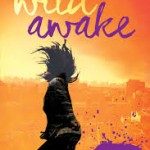Wild Awake (Katherine Tegan Books/HarperCollins) by Hilary T. Smith, $17.99.
Hilary T. Smith creates an absorbing coming-of-age story with this debut novel depicting a world turned manic when a stranger calls 17-year old Kiri Byrd and says he has her dead sister’s stuff. The phone call sets Kiri on a mission to uncover family secrets and leads her through midnight bicycle rides, music, madness and art.
Kiri’s sleepless world becomes a confusion between perception and reality, genius and madness, peace and turmoil. This is a novel that intimately captures the sleepless spiral into hyper-reality of a hypo-manic teen. But it is also a novel that captures the reality of a family walking the creative line of genius and also torn by the death of someone who, like the sister who seeks answers, may have stepped over the line into madness. Horn Book Magazine says of debut author Smith, “Smith embraces the complexities of grief, family dynamics, creativity, mental illness, and love and pens them with a thoughtful, subtle hand.”
The world Smith captures is all-encompassing, her character’s voice is flowing, swift and flawless. Her rapid-fire reactions drive this story to capture Kiri’s life at its lowest, highest and most blurred.
No one can talk about the organized chaos of Kiri’s mind better than the author who wrote on her website: “Many people experience some kind of mental Thing (to use Kiri’s word) at some point in their lives, whether they self-identify with a word like ‘bipolar’ or ‘schizophrenic’ or not. As most of you already know, I am one of them. Mental illness can make you feel alone and terrified, especially as a young adult—like you’re on a distant planet where nobody can reach you. Novels like Janet Frame’s The Edge of the Alphabet saved me from that terror by giving voice to the strangeness, horror, and profound beauty of that place.
When people find out that I’ve written about mental illness, they often tell me about their friends and loved ones who didn’t make it. They always use that expression—”didn’t make it”—which I’ve always found interesting for its connotations of journeys and quests. Not everyone who gets called to the underworld makes it back alive. Not everyone who wrestles with the Minotaur wins.”
Smith’s personal story and her novel contribute to our understanding of mental health issues and she provides hope to readers: “The better I get to know my own underworld, the more I believe that the stories we tell ourselves about mental illness are a crucial factor in determining how many people do make it. Our songs, poems, and metaphors—the language available to us for talking about experiences which are more complex than almost anyone is willing to acknowledge—these things matter both for our survival as a society and as individuals.
I used to think that mental illness had clear answers, that you could take it apart like an IKEA desk and spread the pieces out neatly on the floor. Now, I’m not so sure. What I do know is that stories are powerful, and the right one can make the difference between coming back from the underworld and getting consumed by it. The right story can act like a torn map or a candlestub: imperfect, but maybe just enough to light the way.”
You can visit Smith’s blog at http://www.hilarytsmith.com/

3 comments for “Wild Awake: The voice of mania while coming of age”